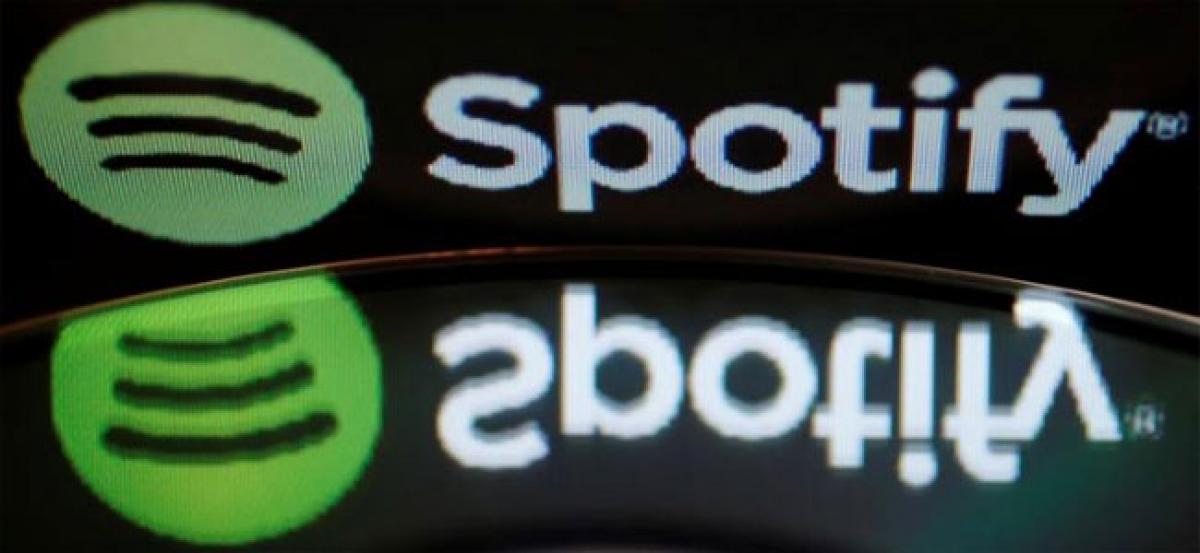Live
- Two Russian oil tankers with 29 on board damaged due to bad weather
- Telangana's Traditions Will Be Protected, Village by Village : BRS Leader MLC K. Kavitha
- Uganda to relocate 5,000 households from landslide-prone areas in eastern region
- Harish Rao Criticizes CM Revanth Reddy: "His Time is Over"
- Vijay Sethupathi Hails 'Vidudala-2' as a Theatrical Game-Changer
- Sahaj Yog: A Path to Inner Transformation and Harmony City takes giant strides
- Allu Arjun meets his uncle Nagababu at his residence
- J&K L-G felicitates Langar organisations & NGOs for contribution during Amarnath Yatra
- Hit by Covid, MP's Rakesh Mishra sees revival of his fortunes, courtesy PM SVANidhi scheme
- Trailblazing Yakshagana Artiste Leelavathi Baipaditthaya No More
Just In

Music streaming service Spotify, most recently valued at $13 billion, will be the first major company to carry out a direct listing on the New York Stock Exchange when it goes public later this year or early next year, two sources familiar with the situation said on Friday.
Music streaming service Spotify, most recently valued at $13 billion, will be the first major company to carry out a direct listing on the New York Stock Exchange when it goes public later this year or early next year, two sources familiar with the situation said on Friday.
The move would be the biggest test yet for the direct listing process, which for companies willing to list shares without raising capital eliminates the need for a Wall Street bank or broker to underwrite an initial public offering (IPO) along with many associated fees.
If successful, it could change the way companies approach selling shares to the public.
The Swedish technology firm is working with investment banks Morgan Stanley, Goldman Sachs Group Inc and Allen & Co to advise them on the process, the sources said.
Spotify, the New York Stock Exchange, Morgan Stanley and Goldman declined comment. Allen & Co did not immediately respond to a request for comment.
In a traditional IPO, investment bank underwriters sell new shares of a company to the public at a price they determine based on investor feedback. The underwriters leading this process are backed by an IPO syndicate, sometimes comprising more than a dozen banks, which share the responsibility of selling and allocating shares to investors.
In a direct listing, a company does not raise money by offering new shares for sale, but instead makes existing shares immediately available to the public, meaning employees and investors can buy and sell as they wish. That dispenses with the need for banks to market and sell the company's shares.
Spotify's decision to side-step underwriters could be a hit to investment banks that rely on fees from marquee listings.
Proceeds from IPOs fell 40 percent last year from 2015. Technology IPOs, often a large chunk of the market, were down 56 percent, according to Thomson Reuters data.
Last year Spotify raised $1 billion in convertible debt from private equity firm TPG Capital Management LP and hedge fund Dragoneer Investment Group. The round came with a provision allowing TPG and Dragoneer to convert their debt into equity at a discount of 20 percent or more to the offering share price of an IPO, depending on when the company goes public.
It was unclear how that stipulation would be handled in a direct listing.
RISKS, VOLATILITY
Direct listings are not without risk. Investment banks seek to set an IPO price that fits demand while leaving room for the company's shares to rise further in the market. Without this guidance, a company's stock price is more exposed to gyrations.
There is also no "lock-up" period to prevent early-stage investors and employees from selling shares in the months following a listing. Without that, a stock could experience heavy turnover and price fluctuations just as the company is getting its public market footing.
Direct listings also do not eliminate all Wall Street costs. Investment banks still advise companies on how to get their financials in order and articulate why they are a good investment, even if they do not get involved in building materials to show investors at so-called roadshows.
Examples of companies of Spotify's size that have directly listed are scant, though Freddie Mac did so in 1989.
A direct listing for a large company such as Spotify may be hard to replicate, industry sources said. Companies less well-known would likely need bankers to market shares, while Spotify can rely on consumer familiarity and media exposure.
Spotify, which has yet to post a profit as it expands in markets worldwide and builds new offices in New York, lost 173 million euros ($189 million) in 2015, according to the latest figures disclosed by its Luxembourg-based holding company.
In recent months, it has sought to build up its service by striking deals with music labels. In April, it announced a licensing deal with Universal Music Group Inc that could make the streaming platform more attractive to its top-selling artists, including Taylor Swift, Adele, Lady Gaga, Coldplay and Kanye West, by letting them release albums exclusively to premium users.
Spotify hopes to strike deals with Warner Music Group and Sony Music in the run-up to the IPO, one of the sources said.

© 2024 Hyderabad Media House Limited/The Hans India. All rights reserved. Powered by hocalwire.com







